Related Research Articles
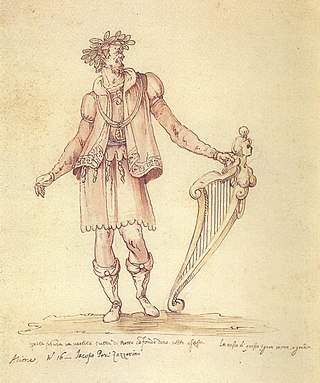
Jacopo Peri, known under the pseudonym Il Zazzerino, was an Italian composer and singer of the transitional period between the Renaissance and Baroque styles, and is often called the inventor of opera. He wrote the first work to be called an opera today, Dafne, and also the first opera to have survived to the present day, Euridice (1600).
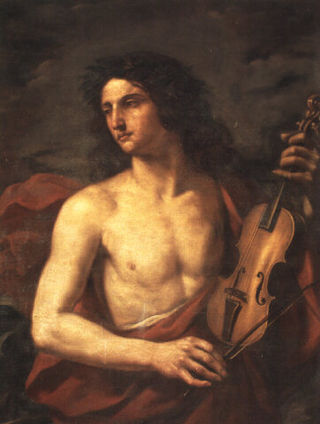
L'Orfeo, sometimes called La favola d'Orfeo[la ˈfaːvola dorˈfɛːo], is a late Renaissance/early Baroque favola in musica, or opera, by Claudio Monteverdi, with a libretto by Alessandro Striggio. It is based on the Greek legend of Orpheus, and tells the story of his descent to Hades and his fruitless attempt to bring his dead bride Eurydice back to the living world. It was written in 1607 for a court performance during the annual Carnival at Mantua. While Jacopo Peri's Dafne is generally recognised as the first work in the opera genre, and the earliest surviving opera is Peri's Euridice, L'Orfeo is the earliest that is still regularly performed.
The Florentine Camerata, also known as the Camerata de' Bardi, were a group of humanists, musicians, poets and intellectuals in late Renaissance Florence who gathered under the patronage of Count Giovanni de' Bardi to discuss and guide trends in the arts, especially music and drama. They met at the house of Giovanni de' Bardi, and their gatherings had the reputation of having all the most famous men of Florence as frequent guests. After first meeting in 1573, the activity of the Camerata reached its height between 1577 and 1582. While propounding a revival of the Greek dramatic style, the Camerata's musical experiments led to the development of the stile recitativo. In this way it facilitated the composition of dramatic music and the development of opera.

Giovanni Maria Artusi was an Italian theorist, composer, and writer.

Emilio de' Cavalieri, or Emilio dei Cavalieri, the spellings "del" and "Cavaliere" are contemporary typographical errors, was an Italian composer, producer, organist, diplomat, choreographer and dancer at the end of the Renaissance era. His work, along with that of other composers active in Rome, Florence and Venice, was critical in defining the beginning of the musical Baroque era. A member of the Roman School of composers, he was an influential early composer of monody, and wrote what is usually considered to be the first oratorio.
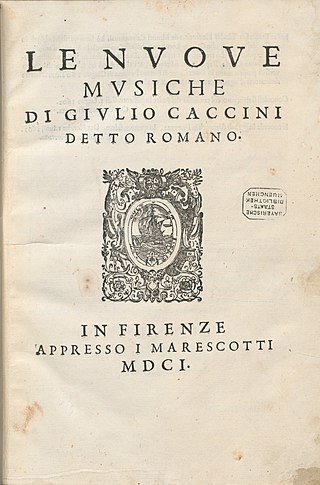
Giulio Romolo Caccini was an Italian composer, teacher, singer, instrumentalist and writer of the late Renaissance and early Baroque eras. He was one of the founders of the genre of opera, and one of the most influential creators of the new Baroque style. He was also the father of the composer Francesca Caccini and the singer Settimia Caccini.

Francesca Caccini was an Italian composer, singer, lutenist, poet, and music teacher of the early Baroque era. She was also known by the nickname "La Cecchina" [la tʃekˈkiːna], given to her by the Florentines and probably a diminutive of "Francesca". She was the daughter of Giulio Caccini. Her only surviving stage work, La liberazione di Ruggiero, is widely considered the oldest opera by a woman composer. As a female composer she helped to solidify the agency and the cultural and political programs of her female patron.
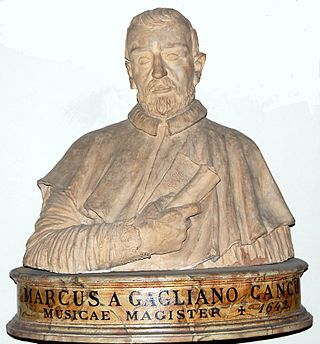
Marco da Gagliano was an Italian composer of the early Baroque era. He was important in the early history of opera and the development of the solo and concerted madrigal.

Ottavio Rinuccini was an Italian poet, courtier, and opera librettist at the end of the Renaissance and beginning of the Baroque eras. In collaborating with Jacopo Peri to produce the first opera, Dafne, in 1597, he became the first opera librettist.
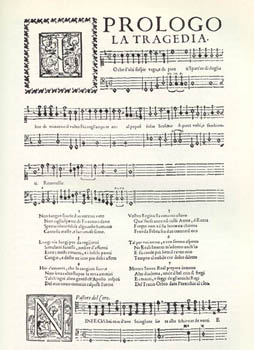
Euridice is an opera by Jacopo Peri, with additional music by Giulio Caccini. It is the earliest surviving opera, Peri's earlier Dafne being lost. The libretto by Ottavio Rinuccini is based on books X and XI of Ovid's Metamorphoses which recount the story of the legendary musician Orpheus and his wife Euridice.
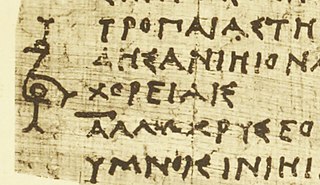
Timotheus of Miletus was a Greek musician and dithyrambic poet, an exponent of the "new music." He added one or more strings to the lyre, whereby he incurred the displeasure of the Spartans and Athenians. He composed musical works of a mythological and historical character.
Seconda pratica, Italian for "second practice", is the counterpart to prima pratica and is sometimes referred to as Stile moderno. The term "Seconda pratica" first appeared in 1603 in Giovanni Artusi's book Seconda Parte dell'Artusi, overo Delle imperfettioni della moderna musica, where it is attributed to a certain L'Ottuso Accademico. In the first part of The Artusi (1600), Artusi had severely criticized several unpublished madrigals of Claudio Monteverdi. In the second part of this work, L'Ottuso Accademico, whose identity is unknown, defends Monteverdi and others "who have embraced this new second practice". Monteverdi adopted the term to distance some of his music from that of e.g. Giovanni Pierluigi da Palestrina and Gioseffo Zarlino and to describe early music of the Baroque period which encouraged more freedom from the rigorous limitations of dissonances and counterpoint characteristic of the prima pratica.
Francesco Rasi was an Italian composer, singer (tenor), chitarrone player, and poet.
Rappresentatione di anima et di corpo is a musical work by Emilio de' Cavalieri to a libretto by Agostino Manni (1548-1618). With it, Cavalieri regarded himself as the composer of the first opera or oratorio. Whether he was actually the first is subject to some academic debate, as is whether the work is better categorized as an opera or an oratorio. It was first performed in Rome in February 1600 in the Oratorio dei Filippini adjacent to the church of Santa Maria in Vallicella.

The art form known as opera originated in Italy in the sixteenth and seventeenth centuries, though it drew upon older traditions of medieval and Renaissance courtly entertainment. The word opera, meaning "work" in Italian, was first used in the modern musical and theatrical sense in 1639 and soon spread to the other European languages. The earliest operas were modest productions compared to other Renaissance forms of sung drama, but they soon became more lavish and took on the spectacular stagings of the earlier genre known as intermedio.
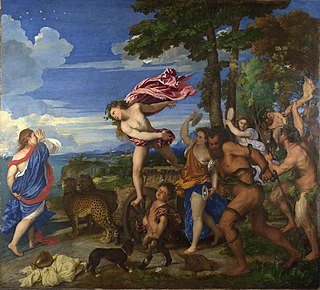
L'Arianna is the lost second opera by Italian composer Claudio Monteverdi. One of the earliest operas in general, it was composed in 1607–1608 and first performed on 28 May 1608, as part of the musical festivities for a royal wedding at the court of Duke Vincenzo Gonzaga in Mantua. All the music is lost apart from the extended recitative known as "Lamento d'Arianna". The libretto, which survives complete, was written in eight scenes by Ottavio Rinuccini, who used Ovid's Heroides and other classical sources to relate the story of Ariadne's abandonment by Theseus on the island of Naxos and her subsequent elevation as bride to the god Bacchus.

La Dafne (Daphne) is an early Italian opera, written in 1608 by the Italian composer Marco da Gagliano from a libretto by Ottavio Rinuccini. It is described as a favola in musica composed in one act and a prologue. The opera is based on the myth of Daphne and Apollo as related by Ovid in the first book of the Metamorphoses. An earlier version of the libretto had been set to music in 1597–98 by Jacopo Peri, whose Dafne is generally considered to be the first opera.
Il rapimento di Cefalo was one of the first Italian operas. Most of the music was written by Giulio Caccini but Stefano Venturi del Nibbio, Luca Bati and Piero Strozzi also contributed. The libretto, by Gabriello Chiabrera, is in a prologue, five scenes and an epilogue and is based on the Classical myth of Cephalus and Aurora.

Timotheus was a famous aulos player from Thebes, who flourished in Macedon during the reigns of Philip II and Alexander the Great. He later accompanied Alexander in his campaigns. After his death, a story about the effect of his music on Alexander became a familiar reference point in literature on the power of music to influence emotion.
References
- 1 2 "Barbara Russano Hanning". cuny.edu.
- ↑ "Profile: Barbara Hanning" Archived May 18, 2008, at the Wayback Machine , Music Department, City College of New York
- ↑ "Barbara Russano Hanning". W.W. Norton and Co.